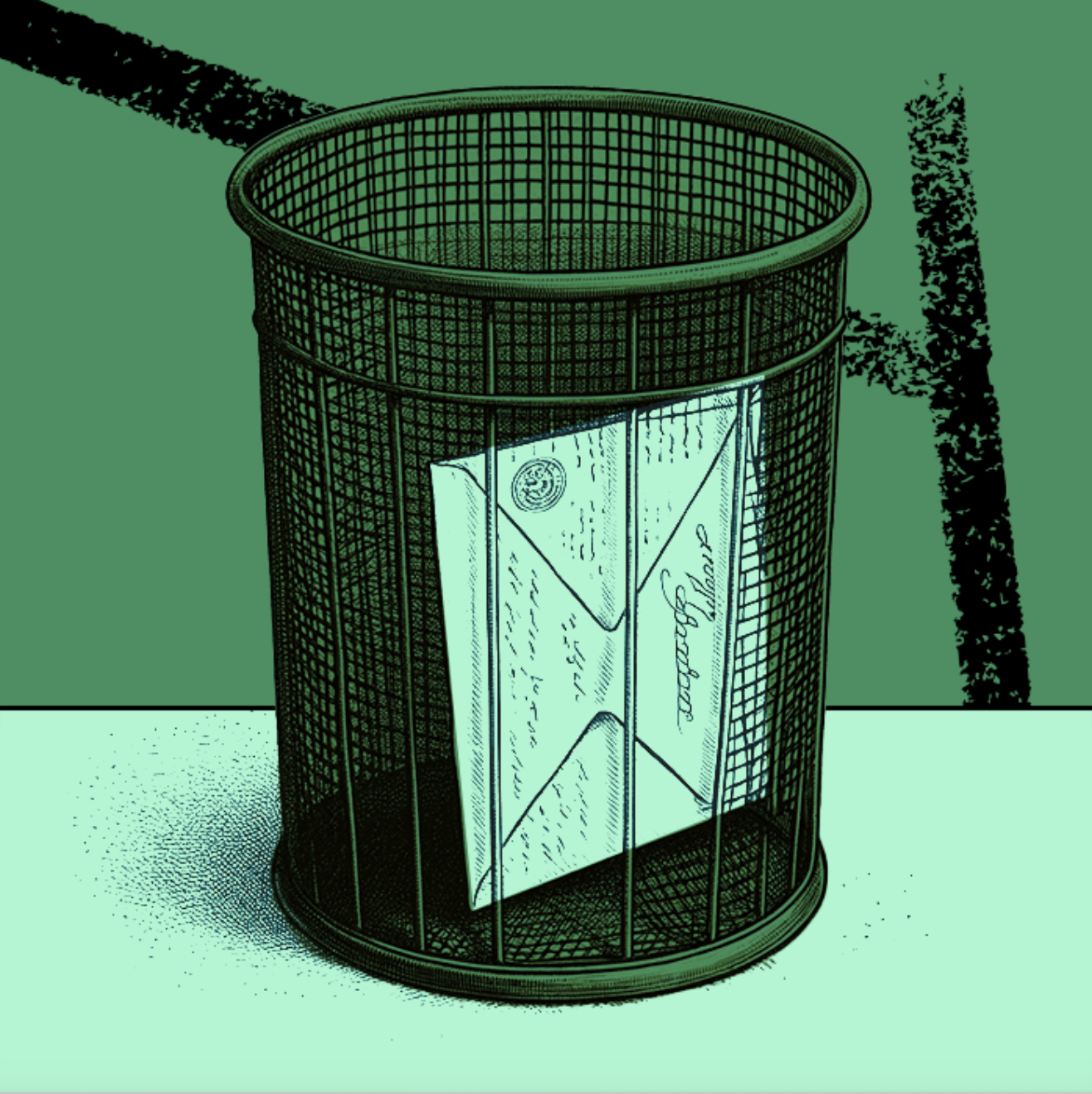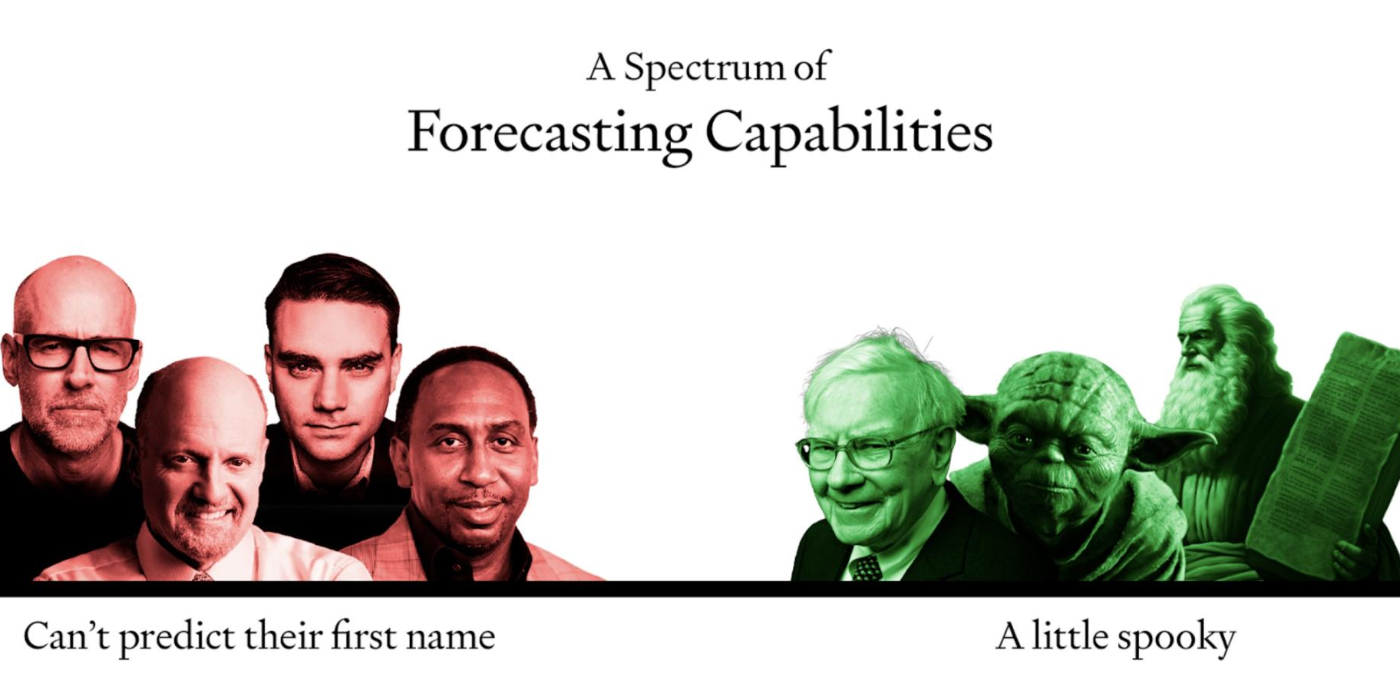
I have one constant companion—doubt. With every keystroke I make, there is a devil perched on my shoulder questioning whether I deserve to write. I now earn more from writing than I did from my fancy tech job, which, while remarkable, feels undeserved.
If I wanted to dispel that feeling, I have a couple of options—Oreos, Prozac, pounding Diet Coke until my eyes bleed—but I think the best solution is Napkin Math™. Accordingly, this post is the Napkin Math on whether I’m good at my job. I’ll go through the outcomes I predicted in my essays last year, score their accuracy, and see what I got wrong.
All writers should do this exercise, as too many skate by on reputation and cultural cache. Public reckonings with accuracy hold you accountable to the audience on whether the product they are paying for is worthwhile. My goal is that you pay me for accuracy. This piece is about whether the investment is worth it.
To prepare, I read everything I’ve written over the last 12 months and scored myself from 1-20 on the accuracy of the forecasts I made. A 1 is terrible, awful, Quibi-is-the-future-of-entertainment-level of take. A 20 is a spooky, 100% correct forecast.
Image credit: Lucas Crespo
I’d estimate that a lifetime average score of 12 is the minimum acceptable level of performance for a newsletter writer. My hope was for 15. If I got a result below 9, I was going to quit and go back to the farm.
Last year, I scored an average of 16.45 average and a median of 17.5, which translates to a roughly 80% accuracy rate on my calls. This year saw a marked improvement in my score, with a median of 19.5 and an average of 18.5. In 2023 I published over 50 pieces, with most containing one or two predictions, so it’s a decent sample size. The math would say that I am a much-improved analyst. When coupled with the increased virality of my pieces and our reader survey showing more subscribers rating my work highly, I had a very good year.
While my averages were high, a few things brought them down:
- I was too generous in my estimation of humanity. I thought that this was the year that we finally got serious about understanding algorithmic feeds in content. Very predictably, no progress past tribalism was made.
- In 2022, I proposed some business strategy theories that were proven true relatively quickly. This year, I proposed similarly grand theories about the internet, but I wasn't lucky enough that evidence immediately proved me right. Unfortunately, evidence does not yet adhere to a fiscal year schedule, though hopefully some obvious proof points will surface soon.
I also had some pretty strong wins:
- The creator economy is going to crash. Significant layoffs and shutdowns have occurred in the six months since I made this prediction.
- Media layoffs will continue as the ad model suffers. The winners will be multi-SKU and community-first. Nearly all media companies had layoffs this year, but those that had multiple revenue streams, like the Daily Wire, did much better.
- AI looks like a bubble. Pricing is out of control, and I’m hearing backroom whispers that growth rates for most AI startups are stagnating. The initial adoption curve has ebbed, and VCs are reeling from somehow doing 100x ARR rounds again.
- Pornhub’s acquisition was a scam. This piece engendered my first real flirtation with mainstream media coverage. I spoke with Bloomberg and some other outlets. The piece and accompanying Twitter thread got retweeted by Bill Ackman and racked up millions of views.
You would think with the increased accuracy, virality, and income, I would be satisfied. That is not the case. I’m frustrated with my performance and think that next year merits an evolution in my writing.
What is it that I do?
Right now, I’m like a Harvard undergrad: convinced of my own self-importance and benefiting from grade inflation. That my median score is a 19.5/20 doesn’t mean that I am smart but merely that my calls were not ambitious enough. While I am mostly directionally accurate—when I say a company is going to suck, it does, and when I say a technology trend is the future, it usually is—I fail you, my readers, by not being more specific with my claims.
There are two potential layers of richness that I could add.
The first is pricing. In nearly all of my work in 2023, I avoided doing pricing analysis. I am deeply hesitant to do this type of work publicly. Writing a stock-picking newsletter holds no interest for me, and frankly, if I wanted to do discounted cash flow models regularly, I should go back to working at a fund. Still, I think there are marginal improvements that would be beneficial to add to my coverage for next year. Any company analysis that I do should be grounded in multiples, averages, and other simple price comparisons. I hope it will result in my having more balanced opinions while not being enough for someone to justify a stock purchase. It’s a happy middle ground between selling my soul back to finance and giving you a better product.
The second is specificity. Another failure in my writing over the past year was that I would make a claim like, “The creator economy is going to fail over the next few months.” Instead, I should have the level of rigor to predict that “40% of creator economy startups will fail over the next five months.” I don’t think this will materially improve the enjoyment or insights that readers would gain from my writing, but a more intellectually honest product would call out timelines and amounts in more detail. Even if I am the only one that cares, being emotionally honest will create better work in the long term.
Beyond making my analysis more concrete, I need to also address the elephant in the room: I haven’t been doing Napkin Math.
I do be befuddled
The way to succeed in media is to “own your niche.” You have to pick a narrow interest or specific problem, and create stuff around that thing. Be the “e-commerce guy” or the “Excel girl,” or whatever. Intellectually, I know this is right! I myself have said it to aspiring media entrepreneurs. However, this advice doesn’t seem to fully apply to me. The weirder and more widely I have published, the more readers have responded, both in dollars and views. When I started blogging three years ago, I pretty strictly wrote about finance. This year I published multiple book reviews, dabbled in investigative journalism, preached anti-productivity productivity advice, provided product demos, and wrote a love letter to my wife. Very little of this has to do with this column’s name of Napkin Math.
Despite being, in polite terms, totally aimless and nicheless, I did well. This is a problem. It’s a nice problem to have, but a problem all the same. Not knowing why I am growing in popularity means that I don’t know what to publish in the future. Should I focus on AI? Should I go back to writing pure company analysis?
I surveyed a couple of dozen readers, and universally the feedback was that they didn’t really care what I wrote—they just “liked my vibe.” When I asked them about their favorite pieces of mine, they all responded with different ones.
So I think that, maybe, the secret ingredient is me. This is such an asshole thing to type. I am truly sorry to have done it. But still, it’s the only answer I can think of. When coupled with the increase in page views, revenue, and accuracy, all signs support the “Evan may be a highly differentiated writer” thesis.
I cannot begin to describe how uncomfortable that possibility makes me. My success feels entirely unearned and gifted to me by the Every team. There is a substantial benefit to being a part of a publication, and I would not be here without Dan and Nathan taking a chance on me. On a personal level, it feels like I have so far to go. But I have to be honest with the data, and I can’t think of a reasonable explanation beyond what I have offered here. (Got an alternative explanation? Leave it in the comments section below.)
So, what do I do about it? The answer is one favored by degenerate gamblers everywhere.
Double down
In his famous commencement address at Stanford, Steve Jobs said:
“Your time is limited, so don't waste it living someone else's life. Don't be trapped by dogma— which is living with the results of other people's thinking. Don't let the noise of others’ opinions drown out your own inner voice. And most important, have the courage to follow your heart and intuition. They somehow already know what you truly want to become. Everything else is secondary.” [Emphasis added]
I could spend another year dithering, hoping for a sign from on high, or I could believe what my numerous customer surveys, intuition, and pages of analysis are telling me. I could believe that I may be good at this. I can trust my heart and intuition that I have the ability to be not just a good writer, but a great one.
So in 2024, I am choosing to bet on myself. I want to write from a place of confidence and faith in my abilities to see how high I can fly.
That means that in the new year you can expect to see some changes around here. I’ll be publishing a lot more. My work will be more accurate, more rigorous, and more wide ranging. We’ll produce new content mediums, *cough* podcast *cough*. And hopefully, my accuracy score in 2024 will decrease. This last year has proved that I’m almost always directionally accurate; now the test of my capabilities is if I can be specific. If I do what I’m planning, I’ll have far more predictions to grade, and my predictions should have enough detail to really test myself.
Thanks for an incredible year, and I can’t wait for what is to come.
The Only Subscription
You Need to
Stay at the
Edge of AI
The essential toolkit for those shaping the future
"This might be the best value you
can get from an AI subscription."
- Jay S.
Join 100,000+ leaders, builders, and innovators

Email address
Already have an account? Sign in
What is included in a subscription?
Daily insights from AI pioneers + early access to powerful AI tools









.08.31_AM.png)

Comments
Don't have an account? Sign up!
I enjoy your writing. You educate, authentically share your internal stuggle, challenge my assumptions, and aspire for greatness. Entertaining and intriguing.
Dude . . . go for it! Your drive to improve is truly amazing. Keep it up!
The title of this made me laugh out loud :)
I have (because I'm an Old Fart and English in the Engerland still) a take on "Napkin Math", that it's 'back of a fag (as in cigarette. Calm down) packet' calculation.
The Steve Jobs thing about living your own life. We have a anarcho-punk thing here - there is no authority except yourself.
Lovely article, happy holidays!
I appreciate anybody who puts themselves out there to be tested against cruel reality. Real failure is not trying. Thank you for providing thought-provoking content.
The freedom you grant yourself to follow your creativity inspires me on a weekly basis.
@gmgunn I meant *curiosity*
I'd be disappointed if you only wrote about one thing.
So glad you have a good relationship with the referee part of you that comes into the writer part of you to say whether or not you made the progress and all possible touchdowns. The truth is, many Every subscribers are doing the same thing by asking should I continue? Here's the promise that attracted me: "What we hope for--We aim to build a writer collective to explore every industry, every topic, and every job role in business. We hope to gather all of this coverage into one place, and make it available to readers as a bundle—for one subscription price." When it stops being EVERY and spends most writing on AI and Crypto, I'll leave quietly.
Congratulations Evan! A big revelation- yes please own your genius. The brightest minds usually believe they are far from it because they have the awareness to know how little they know. But that is an irrelevant measure. Everything is relative and ultimately, looking at the impact you make is what matters. Keep going, follow your heart and intuition and I can predict 💯 that you will fly!
Enjoyed all the different articles this year, keep it up! If you ever find yourself wanting to finish that series on all parts of the income statement, would love to see the rest!
So....new title, should you fire the author of this newsletter...in other words, own that you are deciding on the content of the newsletter so I wouldn't be firing the newsletter, I would be firing the creator of the content...AND I AM NOT FIRING YOU, NOR THE NEWSLETTER...just thought I'd put that in all caps for emphasis and to be very clear. You be you...you be the newsletter but even more so if there is anything to change.
Other readers/commenters...you be you as well.